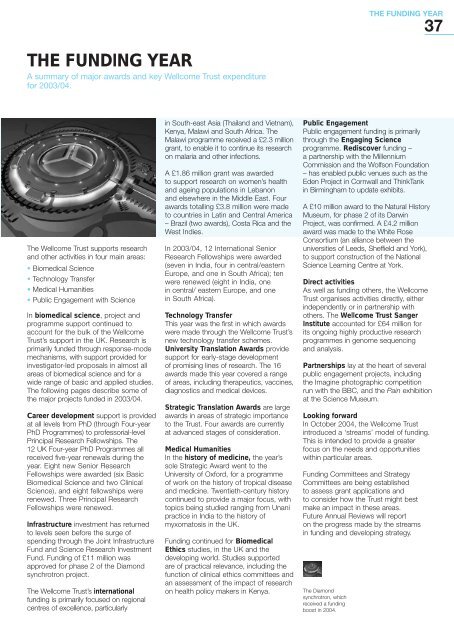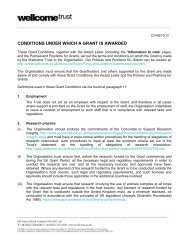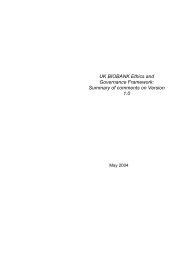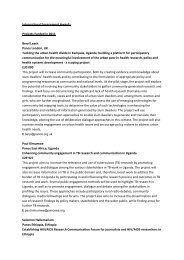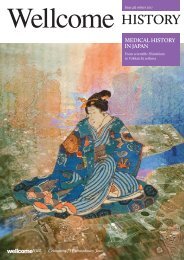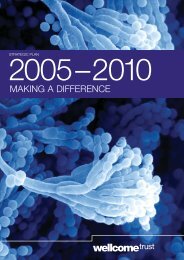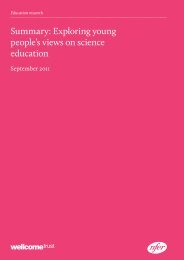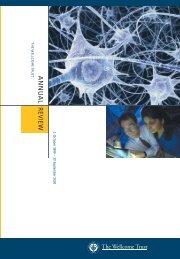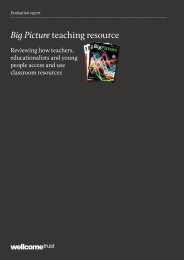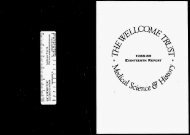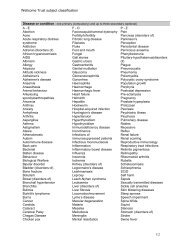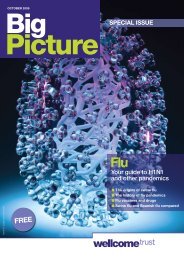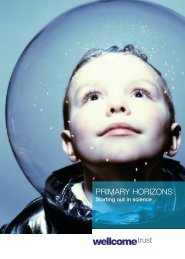You also want an ePaper? Increase the reach of your titles
YUMPU automatically turns print PDFs into web optimized ePapers that Google loves.
THE FUNDING YEAR37THE FUNDING YEARA summary of major awards and key <strong>Wellcome</strong> <strong>Trust</strong> expenditurefor 2003/04.The <strong>Wellcome</strong> <strong>Trust</strong> supports researchand other activities in four main areas:• Biomedical Science• Technology Transfer• Medical Humanities• Public Engagement with ScienceIn biomedical science, project andprogramme support continued toaccount for the bulk of the <strong>Wellcome</strong><strong>Trust</strong>’s support in the UK. Research isprimarily funded through response-modemechanisms, with support provided forinvestigator-led proposals in almost allareas of biomedical science and for awide range of basic and applied studies.The following pages describe some ofthe major projects funded in 2003/04.Career development support is providedat all levels from PhD (through Four-yearPhD Programmes) to professorial-levelPrincipal Research Fellowships. The12 UK Four-year PhD Programmes allreceived five-year renewals during theyear. Eight new Senior ResearchFellowships were awarded (six BasicBiomedical Science and two ClinicalScience), and eight fellowships wererenewed. Three Principal ResearchFellowships were renewed.Infrastructure investment has returnedto levels seen before the surge ofspending through the Joint InfrastructureFund and Science Research InvestmentFund. Funding of £11 million wasapproved for phase 2 of the Diamondsynchrotron project.The <strong>Wellcome</strong> <strong>Trust</strong>’s internationalfunding is primarily focused on regionalcentres of excellence, particularlyin South-east Asia (Thailand and Vietnam),Kenya, Malawi and South Africa. TheMalawi programme received a £2.3 milliongrant, to enable it to continue its researchon malaria and other infections.A £1.86 million grant was awardedto support research on women’s healthand ageing populations in Lebanonand elsewhere in the Middle East. Fourawards totalling £3.8 million were madeto countries in Latin and Central America– Brazil (two awards), Costa Rica and theWest Indies.In 2003/04, 12 International SeniorResearch Fellowships were awarded(seven in India, four in central/easternEurope, and one in South Africa); tenwere renewed (eight in India, onein central/ eastern Europe, and onein South Africa).Technology TransferThis year was the first in which awardswere made through the <strong>Wellcome</strong> <strong>Trust</strong>’snew technology transfer schemes.University Translation Awards providesupport for early-stage developmentof promising lines of research. The 16awards made this year covered a rangeof areas, including therapeutics, vaccines,diagnostics and medical devices.Strategic Translation Awards are largeawards in areas of strategic importanceto the <strong>Trust</strong>. Four awards are currentlyat advanced stages of consideration.Medical HumanitiesIn the history of medicine, the year’ssole Strategic Award went to theUniversity of Oxford, for a programmeof work on the history of tropical diseaseand medicine. Twentieth-century historycontinued to provide a major focus, withtopics being studied ranging from Unanipractice in India to the history ofmyxomatosis in the UK.Funding continued for BiomedicalEthics studies, in the UK and thedeveloping world. Studies supportedare of practical relevance, including thefunction of clinical ethics committees andan assessment of the impact of researchon health policy makers in Kenya.Public EngagementPublic engagement funding is primarilythrough the Engaging Scienceprogramme. Rediscover funding –a partnership with the MillenniumCommission and the Wolfson Foundation– has enabled public venues such as theEden Project in Cornwall and ThinkTankin Birmingham to update exhibits.A £10 million award to the Natural HistoryMuseum, for phase 2 of its DarwinProject, was confirmed. A £4.2 millionaward was made to the White RoseConsortium (an alliance between theuniversities of Leeds, Sheffield and York),to support construction of the NationalScience Learning Centre at York.Direct activitiesAs well as funding others, the <strong>Wellcome</strong><strong>Trust</strong> organises activities directly, eitherindependently or in partnership withothers. The <strong>Wellcome</strong> <strong>Trust</strong> SangerInstitute accounted for £64 million forits ongoing highly productive researchprogrammes in genome sequencingand analysis.Partnerships lay at the heart of severalpublic engagement projects, includingthe Imagine photographic competitionrun with the BBC, and the Pain exhibitionat the Science Museum.Looking forwardIn October <strong>2004</strong>, the <strong>Wellcome</strong> <strong>Trust</strong>introduced a ‘streams’ model of funding.This is intended to provide a greaterfocus on the needs and opportunitieswithin particular areas.Funding Committees and StrategyCommittees are being establishedto assess grant applications andto consider how the <strong>Trust</strong> might bestmake an impact in these areas.Future <strong>Annual</strong> <strong>Review</strong>s will reporton the progress made by the streamsin funding and developing strategy.The Diamondsynchrotron, whichreceived a fundingboost in <strong>2004</strong>.


